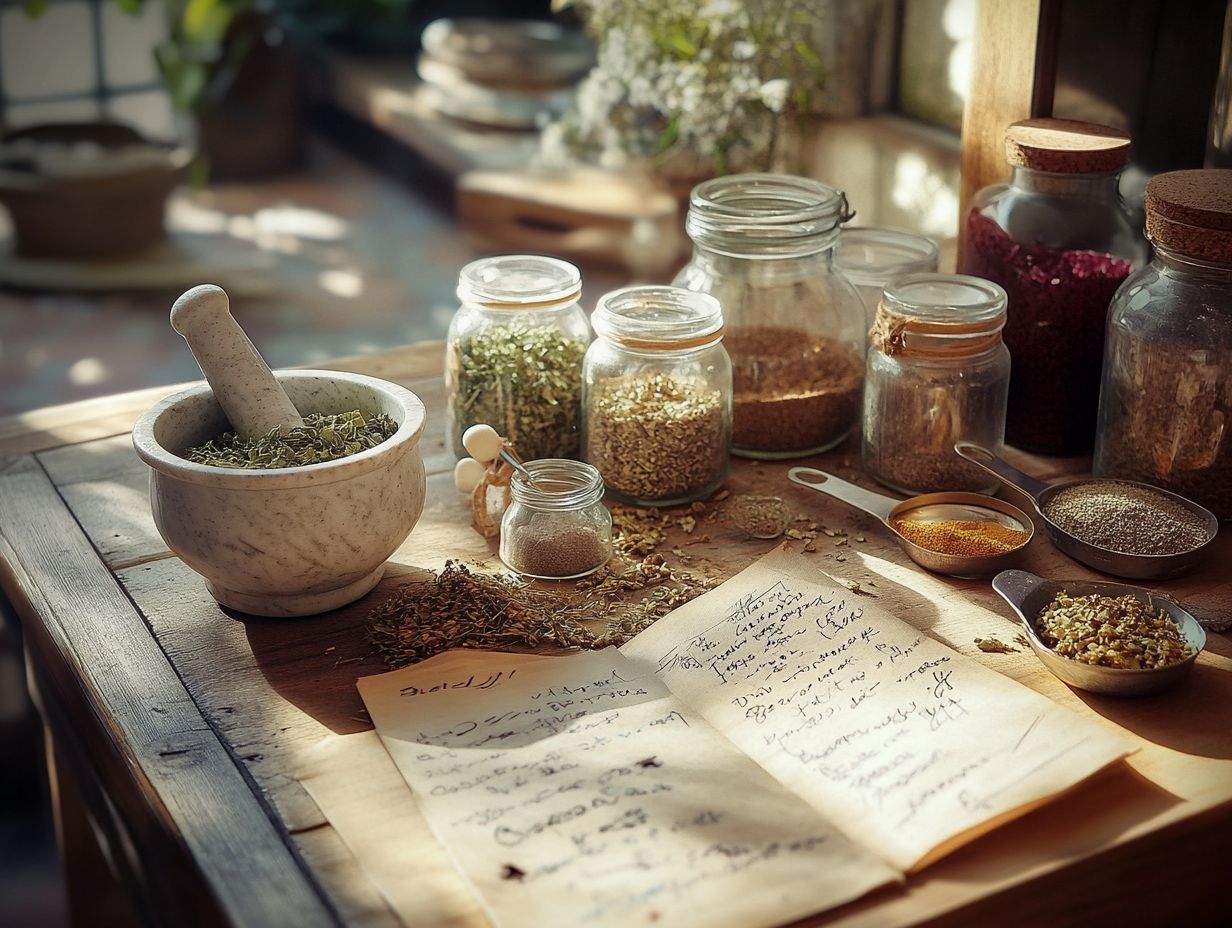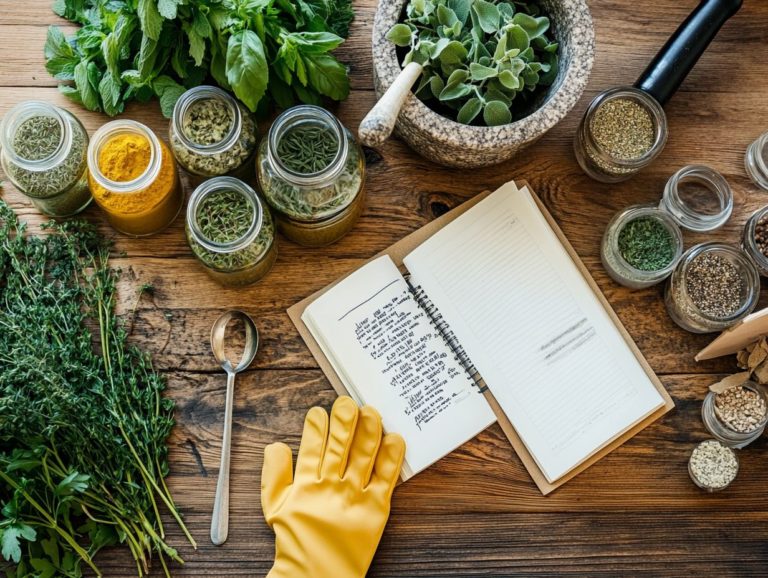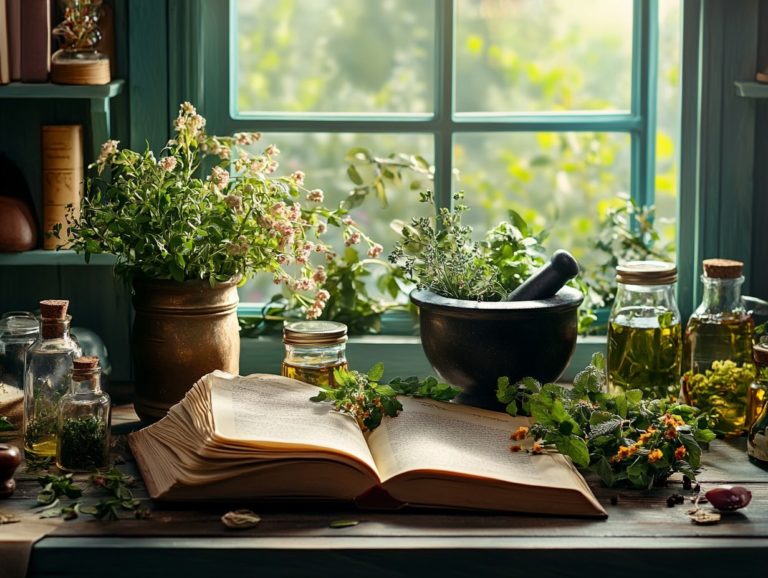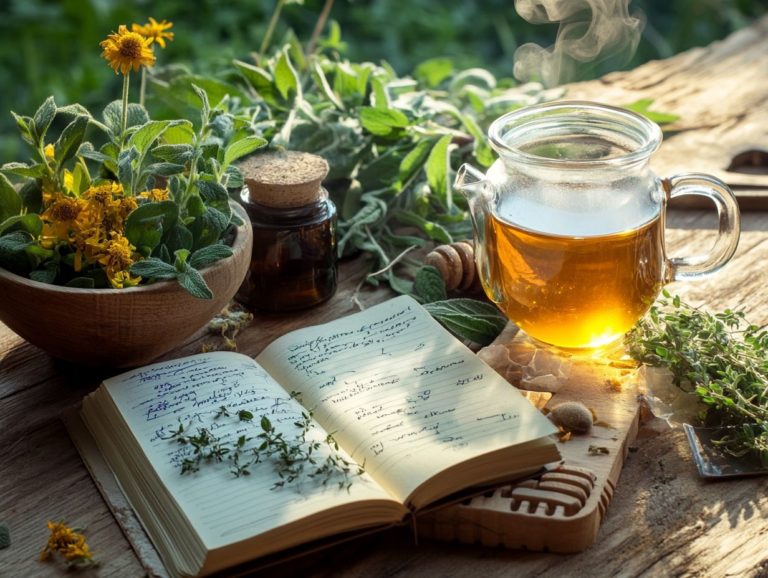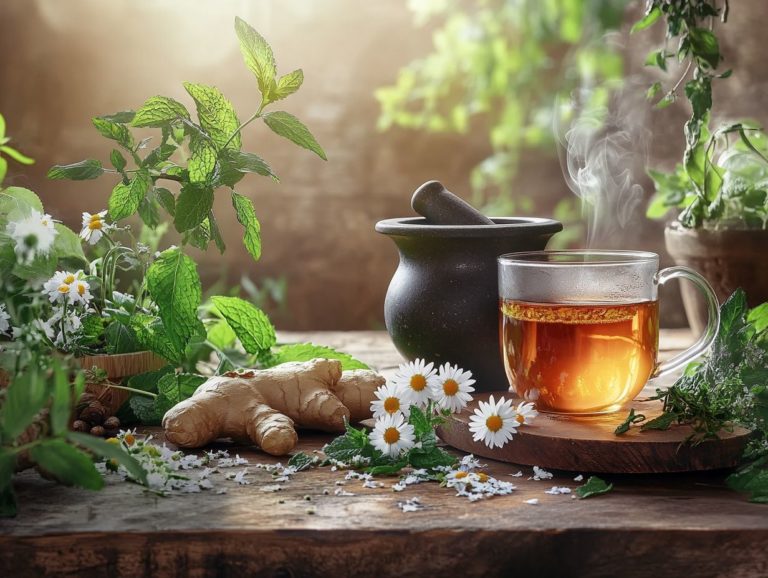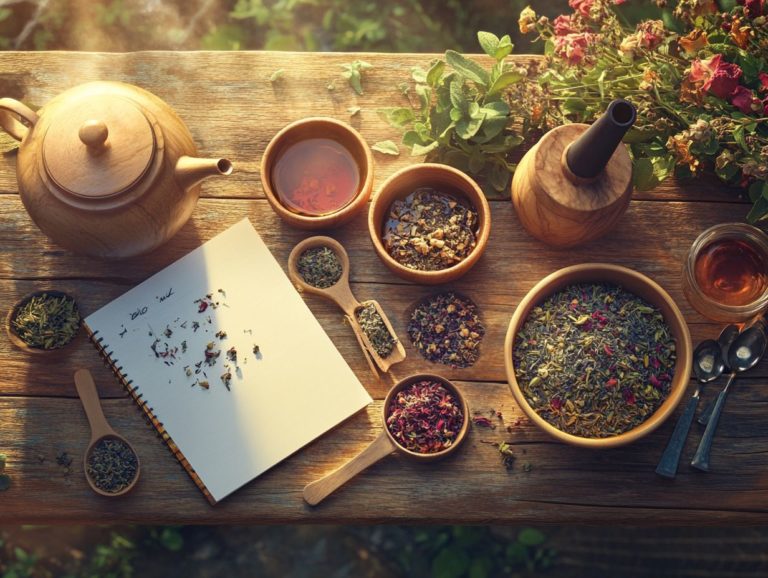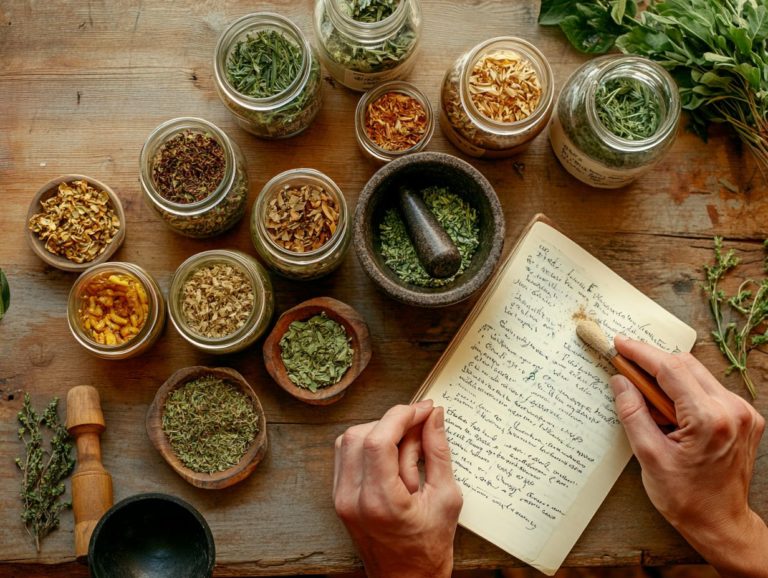How to Make Herbal Remedies with Dried Herbs
Herbal remedies have held a special place in health and wellness for centuries. They provide natural solutions to a myriad of health concerns.
Get ready to explore the amazing benefits of dried herbs! This guide showcases their distinct advantages over fresh options. You ll learn how to select the right dried herbs tailored to your needs and uncover effective methods for preparing them, be it through infusions, decoctions, or tinctures.
You will also explore common herbal remedies, their applications, and crucial safety considerations. Whether you’re a seasoned herbalist or simply curious, this guide will empower you to fully embrace the enriching world of herbal healing.
Contents
- Key Takeaways:
- Benefits of Using Dried Herbs
- Choosing the Right Dried Herbs
- Methods of Preparing Herbal Remedies
- Common Herbal Remedies and Their Uses
- Safety Considerations for Using Herbal Remedies
- Frequently Asked Questions
- How do I make herbal remedies with dried herbs?
- What are the benefits of using dried herbs in herbal remedies?
- Can I use any type of dried herb in my herbal remedies?
- How should I store my dried herbs for making herbal remedies?
- Are there any safety precautions I should take when using dried herbs in herbal remedies?
- What are some common mistakes to avoid when making herbal remedies with dried herbs?
Key Takeaways:
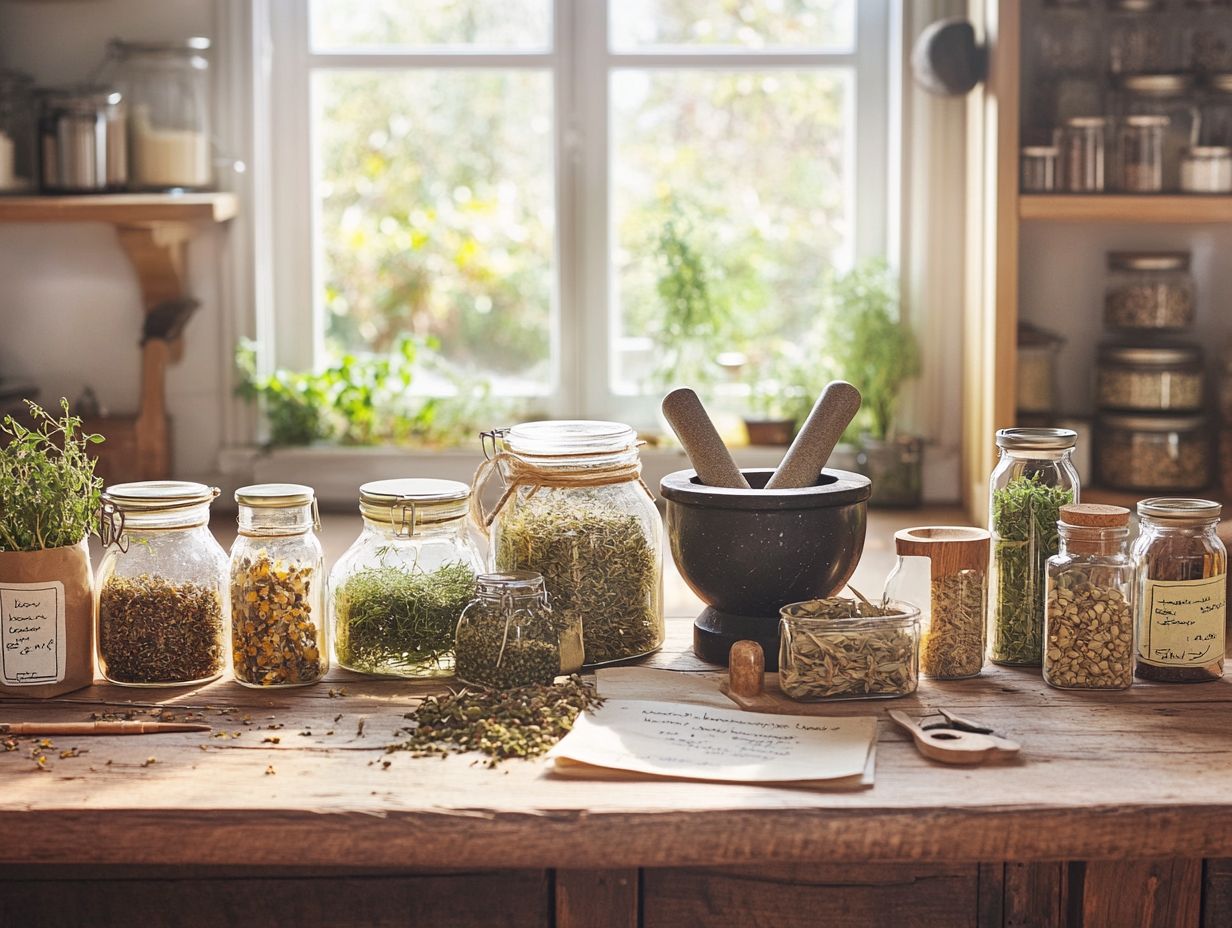
- Discover the benefits of using dried herbs, including longer shelf life and potency.
- Learn to choose the right dried herbs by considering quality and intended use.
- Explore methods like infusions, decoctions, and tinctures, and their benefits.
What are Herbal Remedies?
Herbal remedies are natural treatments derived from plants. They play an important role in herbal medicine, a practice that is cherished across many cultures.
This practice has stood the test of time, including traditional Western approaches. These remedies encompass a diverse array of products such as tinctures, herbal preparations, and dried herbs, all known for their therapeutic properties and positive impacts on health, especially in supporting the immune and digestive systems.
With roots tracing back to ancient civilizations, herbal medicine has evolved significantly, assimilating knowledge from rich traditions like Ayurveda and Traditional Chinese Medicine. Among the many plants in this field, Echinacea stands out for its immune-boosting prowess, while Chamomile is celebrated for its calming effects, helping to alleviate stress and digestive discomfort.
Ginger root, another well-known botanical, is cherished for its delightful flavor and its potential to combat nausea and enhance circulation. These examples underscore the vast scope of herbal remedies and their enduring relevance in today s wellness practices.
Benefits of Using Dried Herbs
Opting for dried herbs presents a wealth of advantages compared to their fresh counterparts. They are a favored selection among herbalists and home apothecary aficionados.
Dried herbs are budget-friendly and have a longer shelf life. They are easy to store, providing a consistent supply for medicinal preparations.
Advantages over Fresh Herbs
You ll discover several distinct advantages to using dried herbs over fresh ones, especially when it comes to herbal remedies and preparations.
Dried herbs retain many of their active compounds and plant nutrients that are good for health. They are easier to store, transport, and incorporate into tinctures and other forms of herbal medicine. For those new to herbalism, exploring 5 essential herbal preparations for beginners can be incredibly beneficial. Thanks to careful drying processes, these herbs often preserve essential oils that might diminish in fresh forms due to moisture or spoilage.
In fact, the concentration of these medicinal properties can sometimes enhance their efficacy when combined with an alcohol base, allowing for superior extraction and assimilation of beneficial compounds.
On the other hand, fresh herbs, while undeniably fragrant and vibrant, tend to lose their potency quickly. They are often less practical for long-term storage or use in precise formulations. For those interested in preserving their benefits, learning how to create herbal tinctures easily can make dried options a more reliable choice for anyone seeking consistent therapeutic effects.
Choosing the Right Dried Herbs
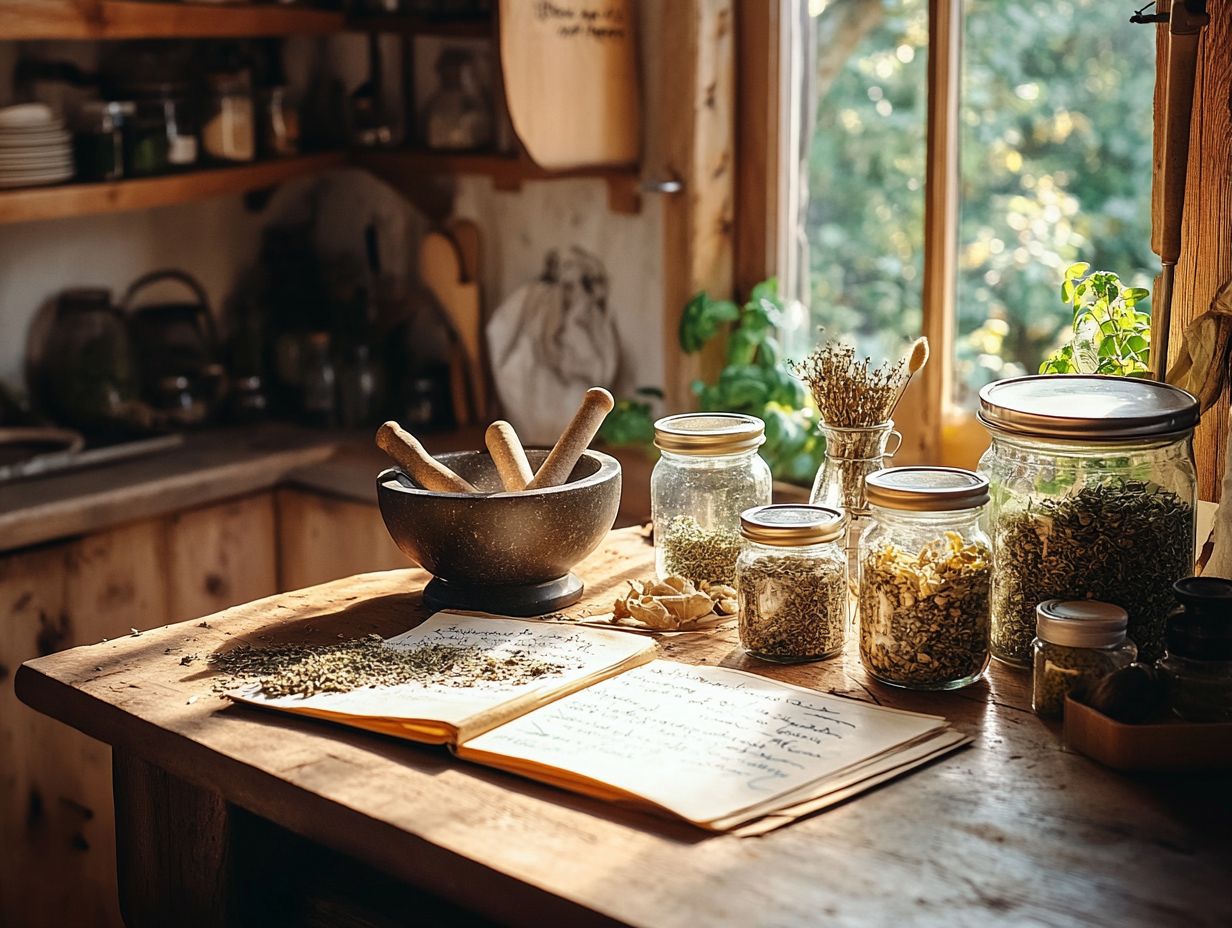
Selecting the appropriate dried herbs for your specific health needs is crucial. Thoughtful consideration of various factors, including their medicinal properties and safety profiles, is essential. Engaging with a knowledgeable herbalist offers invaluable insights and guidance in choosing the best herbs for you.
Leveraging herbal monographs enhances your decision-making process. These resources provide established medicinal profiles that support your selections, along with safety tips for creating herbal remedies.
Factors to Consider
When choosing dried herbs, consider several critical factors to ensure both safety and efficacy. Assess the medicinal benefits of the herbs, their safety profiles, and your individual health needs. Consulting with an experienced herbalist can help navigate the complexities of herbal actions and potential interactions with other medications.
Herbal safety profiles can differ significantly. It’s essential to understand how specific herbs like echinacea, chamomile, or ginger might interact with your unique health conditions. For example, while chamomile is celebrated for its calming effects, it could trigger allergic reactions in those sensitive to related plants. If you’re interested in learning more about herbal preparations, consider exploring how to make your own herbal tea at home. Discussing these details with a knowledgeable herbalist allows you to make informed decisions tailored to your health goals.
This deeper understanding enhances the effectiveness of your herbal remedies and minimizes potential risks. Ultimately, it elevates your overall experience with herbal treatment.
Methods of Preparing Herbal Remedies
Preparing herbal remedies involves a range of sophisticated methods, including infusions, decoctions, and tinctures. Each method offers distinct applications and benefits.
Tinctures are liquid herbal extracts crafted from fresh or dried herbs. They are meticulously macerated in a liquid like alcohol, which extracts the active compounds and therapeutic components, resulting in a potent and versatile remedy. For those interested in a different method, learning how to prepare herbal syrups at home can also provide effective alternatives.
Infusions, Decoctions, and Tinctures
Infusions, decoctions, and tinctures are popular methods in herbal medicine designed to extract the beneficial properties of herbs. Each method is tailored to specific types of herbs and desired outcomes.
When you choose an infusion, you’re steeping delicate herbs in hot water to draw out their essential oils and active compounds. Decoctions are your go-to for tougher plant materials they require a bit of cooking to effectively release their medicinal properties.
Tinctures take it a step further by using alcohol or vinegar to extract concentrated elements from robust herbs. This method offers a potent form of herbal medicine that’s easy to store and simple to administer. For those interested in creating their own remedies, herbal remedies: creating your own capsules can be an excellent option. Understanding the extraction efficacy of different herbs enables you to select the right method for specific herbal actions, whether that’s anti-inflammatory effects, immune support, or digestive aid.
For infusions, think of lighter leafy plants like chamomile or mint, which thrive in this method. In contrast, root-based herbs like ginger or burdock are better suited for decoction.
The significance of these preparation methods extends beyond merely extracting beneficial compounds. They play a crucial role in preserving the therapeutic potential of each herb, ensuring you can harness nature’s healing power effectively.
Common Herbal Remedies and Their Uses
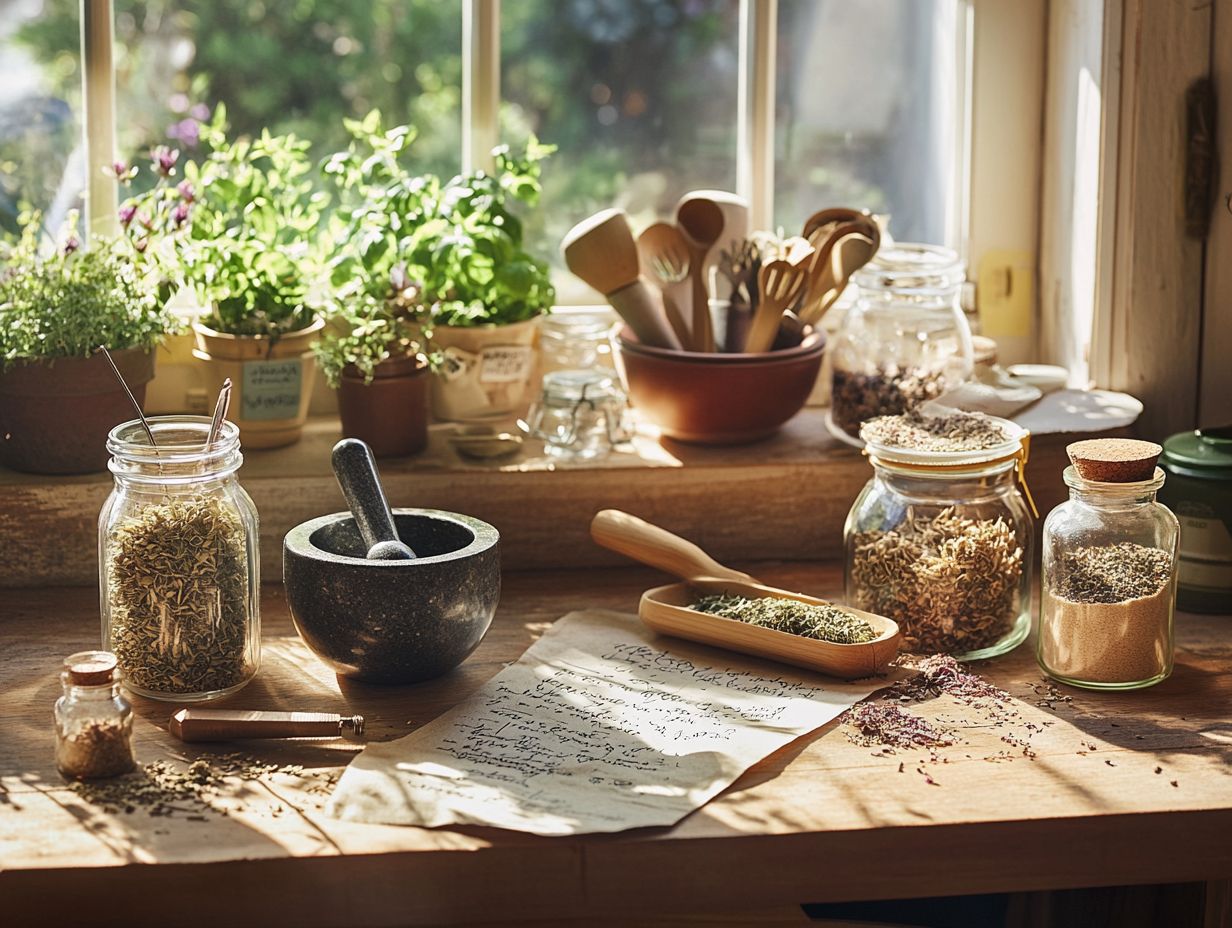
Common herbal remedies like echinacea, ginger root, chamomile, and ashwagandha stand out for their impressive medicinal uses. They effectively address a range of health concerns, from boosting your immune system to soothing digestive issues, ultimately contributing to your overall well-being.
Explore more about these herbal remedies and consider consulting an herbalist to find the best options for your health!
Examples and How to Use Them
Discover how these powerful herbs can transform your health! Examples of popular herbal remedies include St John s wort for mood support, Valerian root for sleep aid, and Holy basil for stress relief. Each herb offers distinct medicinal benefits and therapeutic properties.
Knowing how to effectively use these herbs can greatly enhance their effectiveness. For those interested in a hands-on approach, crafting your own herbal remedies at home can be a rewarding experience. They come in various forms, such as liquid extracts (tinctures), teas, or capsules.
For instance, when considering St John s wort, start with a dosage of 300 mg of the standardized extract taken three times a day. Exceeding this amount may elevate the risk of side effects like photosensitivity, which means being sensitive to sunlight, or gastrointestinal discomfort, such as upset stomach.
Valerian root, often enjoyed in tea or capsule form, may yield optimal results when consumed about 30 minutes before bedtime. However, it is best to limit its use to the short term, as it can lead to daytime drowsiness.
Holy basil, celebrated for its adaptogenic qualities, can be taken as a tincture, typically 30-60 drops daily. It’s advisable to monitor your blood sugar levels during use.
Grasping these nuances allows you to fully maximize the health benefits associated with each of these common herbs.
Safety Considerations for Using Herbal Remedies
In terms of herbal remedies, prioritizing safety is crucial. Some herbs can interact with medications or lead to side effects if not used correctly.
Always consult a qualified herbalist to gain valuable insights into potential risks and to ensure that your herbal preparations are both safe and effective. For guidance on creating your own remedies, check out how to create herbal skin treatments at home, tailored to your unique health needs.
Potential Risks and Precautions
While herbal remedies can provide significant benefits, it is essential to consider the potential risks and necessary precautions to avoid any adverse effects. Understanding the safety profile of each herb and being mindful of your personal health conditions or medications is vital for safe usage.
For example, some herbs may interact negatively with prescription medications, leading to unexpected side effects or diminished effectiveness. Quality sourcing is crucial; not all herbal products adhere to the same standards, and contaminants or mislabeling can pose serious health risks.
When preparing herbal remedies, meticulously follow proper dosage and preparation methods. You should consult a healthcare professional, especially if you have underlying health issues or are pregnant or breastfeeding, to ensure informed usage and effectively mitigate any risks.
Frequently Asked Questions
Start your journey with herbal remedies today, but make sure to consult your healthcare provider first!
How do I make herbal remedies with dried herbs?
Making herbal remedies with dried herbs is not just simple it s an empowering way to take control of your health! First, gather your desired dried herbs and choose a recipe for your remedy.
Next, follow the instructions for brewing or preparing it. This may involve steeping the herbs in hot water, creating a tincture (a concentrated herbal extract), or making an herbal oil or salve. Finally, strain and store your remedy in a clean, airtight container.
What are the benefits of using dried herbs in herbal remedies?
Using dried herbs offers many benefits. They are more concentrated, potent, and have a longer shelf life than fresh herbs.
Dried herbs are also easier to store and transport, making them a convenient option for creating your own herbal collection at home!
Can I use any type of dried herb in my herbal remedies?
Not all dried herbs are suitable for remedies. It s important to choose herbs that are safe and effective for the specific remedy you are making.
Common herbs used include chamomile, peppermint, lavender, and ginger. Always do your research or consult a healthcare provider before using unfamiliar herbs.
How should I store my dried herbs for making herbal remedies?
Proper storage of dried herbs is crucial for maintaining their potency. Store them in a cool, dry place, away from direct sunlight and moisture. Investing in amber glass bottles or Mason jars can keep your herbs fresh and prevent them from absorbing unwanted odors from other pantry ingredients.
Are there any safety precautions I should take when using dried herbs in herbal remedies?
Using herbs safely is key to enjoying their benefits! Always research potential interactions or side effects of the herbs you re using, and consult a healthcare professional if you have concerns. Don’t forget to label your remedies clearly to keep everyone safe!
What are some common mistakes to avoid when making herbal remedies with dried herbs?
There are a few common mistakes people make when using dried herbs in their remedies. Avoid using expired or low-quality herbs, not measuring properly, and ignoring recipe instructions. Be aware of any allergies to certain herbs, and a good understanding of how strong the alcohol is can help when crafting herbal tinctures, which are concentrated extracts made with alcohol.

